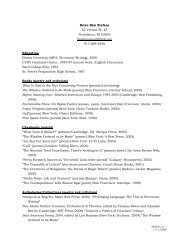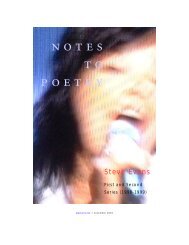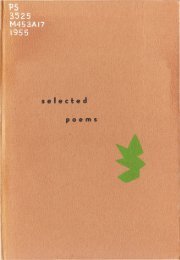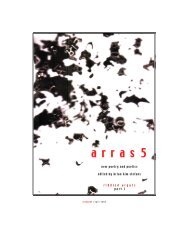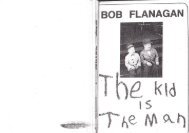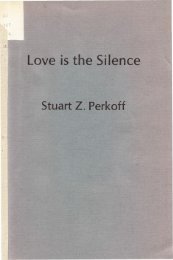new poetry and poetics edited by brian kim stefans - Arras.net
new poetry and poetics edited by brian kim stefans - Arras.net
new poetry and poetics edited by brian kim stefans - Arras.net
You also want an ePaper? Increase the reach of your titles
YUMPU automatically turns print PDFs into web optimized ePapers that Google loves.
whom are around your age – claiming that there is little value in investigating<br />
these <strong>poetics</strong>?<br />
MC: Ted Hughes as point of extremity–now there’s a depressing thought! It’s difficult<br />
for me to answer the first part of your question Brian (my answers would<br />
be as follows: I’m not sure; possibly; I don’t really know), as I don’t really know<br />
what’s being said, or <strong>by</strong> whom, & it does seem to be the case that such discussion<br />
could only have its potential uses after the fact of writing, & even then this<br />
seems doubtful (&, at whatever stage, its hardly an exciting idea–that of a bunch<br />
of writers or explainers sitting around discussing English <strong>poetry</strong> & where it<br />
should go from here–makes me think of Peter Schjeldahl’s little piece on <strong>poetry</strong><br />
in L=A=N=G=U=A=G=E_: “poet clannishness distresses me: people just throwing<br />
away their one <strong>and</strong> only significant advantage in rites of terminal pettiness<br />
<strong>and</strong> boredom”). One of the things I value about being here is the ease with which<br />
one can absent oneself from discussions of this type (I guess this is the “emptiness”<br />
we’ve been mentioning)..<br />
I underst<strong>and</strong> the need for certain younger writers in the US to put some Oedipal<br />
distance between themselves <strong>and</strong> language writing <strong>by</strong> rejecting more polymorphously<br />
referential works–& if they want to do so <strong>by</strong> hiding behind something<br />
Olson or Duncan said once, or <strong>by</strong> writing a paler, less “ironic” version of later<br />
Ashbery, then that’s fine. I just can’t help thinking that it’s sad to get so far &<br />
then turn back (what’s that phrase of Coolidge’s from his Journals–”as if fear of<br />
the unknown were the mother of discourse”?). Also, I don’t see any clear boundaries<br />
anywhere, or that there’s a point where language writing begins or ends (did<br />
Coolidge ever “become” a language writer? did Ray DiPalma? Ted Greenwald?).<br />
How do you throw out language writing but keep hold of Tender Buttons, LZ’s<br />
Catullus, John Wieners’s Behind the State Capitol, Arlene Zekowski, Stanley<br />
Berne, much of the post-Tennis Court Oath exploration of the sixties, &&&?<br />
(I’ve heard rumours of an unpublished book- length poem <strong>by</strong> Dick Gallup which<br />
reads “like Andrews”.) & given that, as Wittgenstein put it, it’s impossible to<br />
write anything more like ourselves than ourselves, it seems crazy to give up on<br />
this notion of “research” or whatever one chooses to call it–the world _is_ complete,<br />
& it doesn’t need other, smaller images of itself inside it. Hence <strong>poetry</strong>’s<br />
great freedom (a responsibility, too) to go off & do other things.<br />
I’m not familiar with the Talisman anthology you mention...I suppose that, if<br />
one has never read Ron Silliman’s Ketjak, or any of Leslie Scalapino’s works, or<br />
Steve Benson’s, or Hannah Weiner’s, or ____________’s (insert preference here),<br />
one could make a case for language writing as being purely formal–well, no, actually,<br />
I can’t see how one could do this at all. & I fail to see how any linguistic<br />
occasion can be “purely formal”–how exactly does one strip language of its social<br />
dimension? The implied opposition of “formal” & “social” seems wilfully naive




